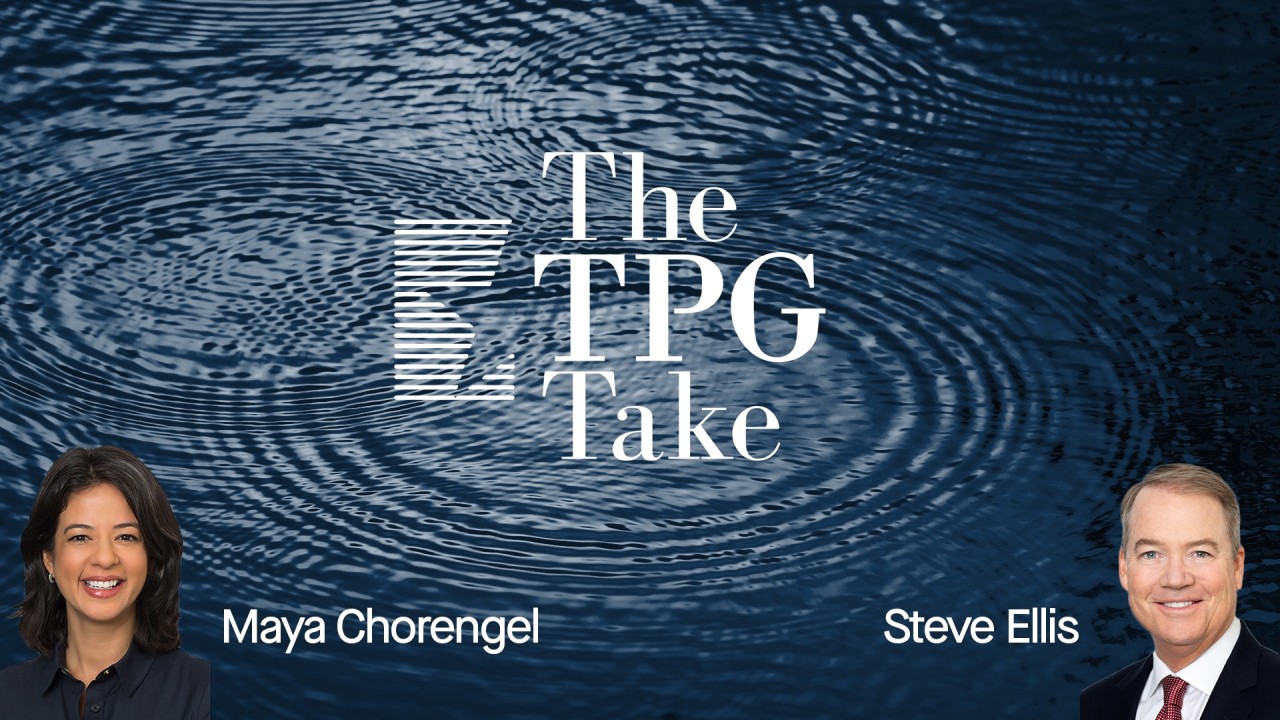
April 2025, Issue #10
Unlocking Access and Commercializing Solutions: The Rise Funds Managing Partners Maya Chorengel and Steve Ellis on Impact Investing
In our latest issue of The TPG Take, we sit down with The Rise Funds Managing Partners Maya Chorengel and Steve Ellis who share their perspectives on the critical role of commercial capital to address various societal and environmental challenges globally at scale.
They also discuss some of the key sectors underpinning The Rise Funds’ approach from education, financial inclusion, and climate, as well as our role in the evolution of the impact investing industry.
Trends Driving Impact Investing
Maya Chorengel: "There's $41 trillion needed for climate technologies and interventions over the course of the next decade, and $37 trillion to produce the outcomes that we need across social challenges in education, healthcare, financial, and work opportunities. Those are enormous sums of money and there is not enough philanthropic capital or government aid in the world to be able to meet that need."
Steve Ellis: "The concept is to unlock both sides of the market. The investors who are confident that they can generate great returns while doing good, and then, of course, convincing the leaders, founders, entrepreneurs, management teams, and boards of these mission- and purpose-driven businesses that they can partner with somebody who cares as much about their mission and purpose as they do.
As we traffic at the front lines of where all the innovation is taking place, one of the things that you see is that the solutions are out there. The technology is evolving and developing very rapidly, but what is holding us back is commercializing and scaling these business solutions quickly enough. And we're trying to do our part to channel the power of commercial enterprise to solve these problems."
The Evolution of Impact Investing
Steve: "When we started Rise, the impact investing industry was very nascent, yet there were companies out there who were growth equity-like in scale that were also deeply impactful. They were collinear, meaning that what they did to make money actually created net positive social and environmental impact. We thought this was a massively underserved market, so we built the Rise platform to serve those highly collinear companies."
Maya: "The next wave of impact investing that we ushered in is what I'd like to call the age of institutionalization. And today, the growth we're seeing is really being led by what's happening in the climate space. We're seeing growth equity strategies like ours come to market, as well as an increase in climate infrastructure funds."
The Rise Funds' Investment Sectors
Maya: "One of the biggest opportunities for The Rise Fund is investing behind financial inclusion. Across Africa, South and Southeast Asia, and Latin America, there are still about a billion and a half people who are underserved by financial services institutions. Bringing them into the financial system is key to making them economically active and spurring economic growth, as well as promoting financial wellness through savings, investing, and effectively reducing the cost of transactions. So Fintech and financial services is a huge market and of deep interest to us in the emerging markets."
Steve: "In the education space, we're focused on several important trends that are impacting lives, particularly of kids in the K-12 space. For instance, the application of artificial intelligence in the world of education led us to the process of adaptive and personalized real-time learning solutions. And as we look at the power of applying AI to the learning process, that tends to open up new themes, new ways to look at opportunities in each of these sectors.
Another major theme in education is the mental health crisis in K-12 today. We've been looking at companies that are trying to address that both from a preventative standpoint – building social and emotional learning solutions into their curriculums and software, particularly for students who are running into learning problems – and also through intervention by having solutions that bring technology-enabled therapy to kids who have special learning needs or have run into acute mental health or behavioral health problems that are preventing them from performing in the classroom."
Maya: "The Rise Fund has a very unique perspective on globalization. What's interesting about our investing practice is how we're able to spot trends that transcend country borders, then take business models that we have learned about, understood, and perfected in the United States, for example, and start exporting them to other markets. By the same token, we've taken innovations in the payments landscape or in the provision of financial services to low-income individuals that we have found works in Africa, and brought them into the US in order to lower costs and increase reach."
A Rigorous Impact Framework
Maya: "One of the fundamental contributions that The Rise Fund made in the impact ecosystem was to raise the threshold of impact underwriting. When we started our work at Rise, there wasn't a standard that would allow us to identify whether a company was actually moving the needle on solving the social or environmental problem that it was meant to solve."
Steve: "We have a rigorous standard for what defines a truly impactful business. In fact, in many cases, even mission- and purpose-driven entrepreneurs have never seen a deep quantification of how their businesses really do impact the world and change the lives of the people they touch."
Maya: "The methodology that we developed called the Impact Multiple of Money – also developed into variations such as the climate yield – is really the framework that allowed us to lift up the practice of evaluating and underwriting for impact."
Enabling Impact Entrepreneurs
Steve: "The impact entrepreneurs that we're seeing today are different in that they are leading organizations who are passionate about making a difference in the world, and yet they're equally passionate about doing that through a for-profit commercial vehicle that is their companies.
I think impact entrepreneurs today understand that the best way to achieve world-changing impact is to create a commercial model that attracts private and, ultimately, public capital to help fund that vision and that mission over time. And a big part of what we try to do at The Rise Fund is find those entrepreneurs and help them through that journey."
Maya: "This is the sorting function that we at The Rise Fund play in the market. We're not only looking for the technical skillset, the leadership qualities, and know-how to build a business, but also that deep-seated impact authenticity, because it's the resilience, the grit, the determination to solve a big problem using business that creates success for our entrepreneurs."
In Other News & Views...
As usual, we also want to "circle back" to share other recent insights from our ecosystem, senior leaders, and investing professionals that you might have missed.
In our series Partnerships in Focus, we hear directly from leaders across the TPG portfolio and ecosystem. In this episode, AJ Shankar, Founder and CEO of Everlaw, discusses how partnering with TPG has helped enhance the mission of the legal technology company, bringing both technological and strategic expertise to help transform its clients’ approach to litigation and investigations with the world’s most advanced eDiscovery software.
Recently, our firm gathered for its inaugural AI Themes Day to discuss trends, transfer insights, and share examples of some of the most innovative and impactful applications of AI we’re seeing across geographies and platforms. Theme discussions ranged across Vertical AI / Data, Cybersecurity and Observability, Data Centers and Energy Infrastructure, and Services Transformation. In this short video, listen to highlights from the day and hear how we’re thinking about AI themes and investment opportunities.
Thank you to all of our followers and readers for joining us for another edition of The TPG Take. Please share the newsletter with anyone you think would be interested and we look forward to being back in your inboxes.

TPG
345 California St suite 3300, San Francisco, CA 94104, USA
Important Disclosures
This material is solely for informational purposes and shall not constitute an offer to sell or the solicitation to buy securities. The opinions expressed herein represent the current, good faith personal views of the author(s) at the time of publication, and do not necessarily represent the views of TPG, its affiliates, or any of its investment professionals. The opinions expressed herein are not definitive investment advice and should not be relied on as such. The information presented herein has been developed internally and/or obtained from sources believed to be reliable; however, TPG does not guarantee the accuracy or completeness of such information. We provide links to third party websites only as a convenience and the inclusion of such links does not imply any endorsement, approval, investigation, verification or monitoring by us of any content or information contained within or accessible from the linked sites. If you choose to visit the linked sites you do so at your own risk, and you will be subject to such sites' terms of use and privacy policies, over which TPG has no control. In no event will TPG be responsible for any information or content within the linked sites or your use of the linked sites. Predictions, opinions, and other information contained in this material are subject to change continually and without notice of any kind and may no longer be true after the date indicated. Any forward-looking statements speak only as of the date they are made, and TPG assumes no duty to and does not undertake to update forward-looking statements. Forward-looking statements are subject to numerous assumptions, risks and uncertainties, which change over time. Actual results could differ materially from those anticipated in forward-looking statements.
